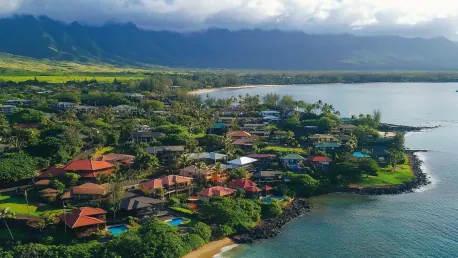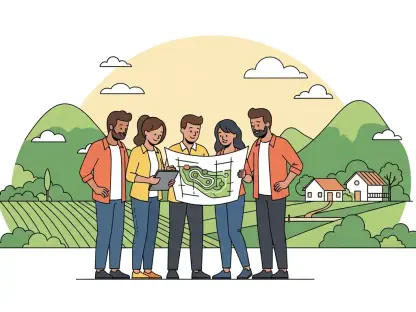The devastating wildfires that ravaged Lahaina in August 2023 left a trail of destruction and displacement in their wake, leading to the loss of thousands of structures and the displacement of numerous residents. As Hawaiian authorities, including Governor Josh Green and Maui Mayor Richard Bissen, grapple with the aftermath, the focus has shifted towards finding housing solutions for those affected. This critical need has resulted in prioritizing residential accommodations over the continuation of short-term vacation rentals, sparking intense debates and triggering potential legal challenges. These developments have cast a shadow of uncertainty over the future of Maui’s rental market as the island seeks a delicate balance between satisfying local housing needs and sustaining its significant tourism industry.
Immediate Aftermath of the Wildfires
In the immediate aftermath of the Lahaina wildfires, the sheer magnitude of destruction demanded an urgent response from Hawaiian authorities, who quickly turned their attention to the pressing need for housing displaced residents. The decision to focus on long-term housing accommodations over maintaining short-term vacation rentals thrust the existing rental market under intense scrutiny. As families and individuals faced the daunting task of rebuilding their lives, officials recognized that providing stable, long-term living arrangements was paramount to recovery efforts.
Governor Josh Green and Mayor Richard Bissen wasted no time in articulating their priorities, placing the welfare of displaced residents above the lucrative vacation rental market. While the rationale behind this decision was clear and necessary, it was met with varied reactions. For many, it signaled a potential threat to an industry that is not only a significant contributor to Maui’s economy but also a vital source of income for many property owners. Concerns quickly arose regarding how the shift in priorities might affect the thousands of vacation rental units spread across the island, igniting a broader conversation about the future of tourism and housing in Maui.
Legislative Actions and Statements
In a series of legislative actions and public statements, both Governor Green and Mayor Bissen emphasized their commitment to addressing the housing crisis precipitated by the wildfires. This policy shift was particularly underscored by the scrutiny of the “Minatoya List,” a list that historically permitted certain properties to operate as short-term rentals in areas where such practices were otherwise restricted. This list quickly became a contentious focal point as it highlighted the complexity and nuance of regulatory frameworks governing short-term rentals in Maui.
The potential phasing out of properties on the “Minatoya List” or their conversion to long-term housing units has sparked fierce debates among property owners, local residents, and policymakers. Property owners argue that the move could devalue their investments and strip them of significant income sources, while policymakers maintain that this is a necessary step to address an exceptional crisis. The tension surrounding this issue reflects broader themes of regulation, economic interests, and the need to adapt in the face of unprecedented challenges.
Potential Legal Showdowns
The proposed restrictions on short-term rentals have set the stage for what many anticipate will be a series of contentious legal battles. Property owners and advocacy groups, such as the Maui Vacation Alliance (MVA), are gearing up to contest these regulatory changes through lawsuits and injunctions. The threat of prolonged litigation looms large, with legal experts predicting that any significant regulatory changes could be delayed for years as the courts navigate the complex landscape of property rights, zoning laws, and emergency policy measures.
This legal uncertainty has already begun to reverberate through the vacation rental market, causing doubts among property owners and potential visitors about the long-term sustainability of short-term rentals in Maui. Property owners are particularly concerned about the viability of their investments amidst an unpredictable regulatory environment, while travelers are increasingly wary of the potential for disruption to their travel plans. The anticipation of lengthy court battles adds another intricate layer to an already volatile situation, contributing to heightened market instability.
Market Uncertainty
As scrutiny intensifies and potential restrictions loom over short-term rentals, the market has been shrouded in a cloud of uncertainty. Property owners, faced with the possibility of stringent regulations, are questioning the long-term feasibility of their investments. The regulatory ambiguities, coupled with rising costs and the perceived anti-tourist sentiment from local authorities, have further compounded these concerns. This has resulted in a palpable decline in bookings, as potential visitors opt for alternative destinations that offer more stability and fewer legal complications.
The market uncertainty has triggered a broader economic unease, with implications extending beyond property owners and vacationers. The tourism industry, a cornerstone of Maui’s economy, finds itself in a precarious position. As travelers increasingly choose other destinations, the ripple effects are felt across various sectors reliant on tourist dollars. This shift highlights the delicate balance Maui must strike between upholding necessary regulations and maintaining an attractive environment for its tourist-driven economy.
Economic Impact
The ramifications of restricting or eliminating short-term rentals in Maui are profound and multifaceted, with significant economic consequences on the horizon. Short-term rentals are vital to the local economy, contributing millions in transient accommodations and general excise taxes. These funds support a range of public services and infrastructure, meaning their loss would create a substantial financial void. Maui County could be compelled to search for alternative revenue sources, potentially leading to increased property taxes or budgetary reallocations and cuts, which could affect public services and community projects.
Beyond tax revenue, short-term rentals play an integral role in sustaining local businesses. Visitors staying in these properties patronize local shops, restaurants, and recreational facilities, driving significant economic activity. The potential curtailment of short-term rentals could lead to a decline in tourist spending, impacting various sectors and leading to job losses. The economic interdependence between the rental market and local businesses underscores the broader implications of the proposed regulatory shifts, highlighting the need for a nuanced approach to policy-making.
Visitor Reactions
Frequent visitors to Maui have not been silent in expressing their frustrations over the rising costs and regulatory uncertainties that now define the island’s vacation rental market. Complaints about escalating expenses, coupled with a perceived anti-tourist sentiment from local authorities, have led many travelers to reconsider their vacation plans. As a result, some are seeking alternative destinations that offer more affordable and stable travel experiences, translating into potential economic losses for Maui’s tourism industry.
For instance, a visitor from Vancouver cited a combination of high prices, legal uncertainties, and an unwelcoming attitude from the local government as reasons for choosing Thailand over Maui. This example is emblematic of a broader trend where travelers are increasingly swayed by the perceived ease and friendliness of alternative destinations. This shift in visitor preferences underscores the substantial economic fallout that Maui is at risk of, should these issues remain unresolved. The island’s ability to attract and retain visitors amidst such challenges will be crucial to its economic recovery and sustainability.
Hotel Industry Impact
The potential decline in short-term rentals has led to speculation that the hotel industry may benefit from reduced competition. On the surface, this presents an opportunity for hotels to capture a larger share of the market, potentially leading to increased occupancy rates and revenue. However, this perceived advantage is tempered by concerns about the overall capacity of Maui’s hotels to accommodate the displaced short-term rental visitors. With already high rates and significant accommodation taxes, there is a risk that Maui could become unaffordable for a broader swath of tourists.
The challenge for the hotel industry is not just about absorbing the influx of visitors but also maintaining the island’s reputation as a desirable and economically accessible destination. The high cost of hotel stays, compounded by additional taxes, may deter some visitors, exacerbating the economic strain on Maui’s tourism-dependent economy. As hotels navigate these complexities, the broader implications for affordability and market dynamics remain a pressing concern.
Local Jobs and Community Impact
The potential elimination or severe limitation of short-term rentals poses a significant challenge not just to the economic landscape but also to local jobs and the broader community. Jobs associated with managing and maintaining vacation rentals typically offer higher pay and more flexible schedules than many hotel positions, providing critical income sources for many Maui residents. The loss of these jobs could exacerbate the economic strain already felt by the community, adding another layer of hardship in the wake of the wildfires.
Moreover, the capacity of Maui’s hotels to accommodate the influx of displaced visitors remains questionable. Given the high rates and associated costs of hotel stays, the island could become unaffordable for many tourists, further impacting the local economy and community livelihood. As the debate over vacation rentals and housing needs continues, the implications for employment and community stability are too significant to overlook.
Property Owners’ Perspectives
For property owners, vacation rentals represent more than speculative investments; they are essential sources of income that make homeownership viable. Many depend on the revenue generated from short-term rentals to cover mortgage payments, property upkeep, and other expenses, highlighting a critical aspect of Maui’s housing market. For some owners, the income from vacation rentals is the only way to afford their homes, making the potential restrictions deeply concerning.
The ongoing debates and proposed regulations have placed property owners in a precarious position, as they navigate the uncertainties of an evolving regulatory landscape. While some argue for the necessity of diversifying income streams beyond short-term rentals, others emphasize that the current economic conditions and housing market leave them with few viable alternatives. Balancing these diverse perspectives will be crucial as Maui strives to address both immediate housing needs and the long-term sustainability of its tourism-driven economy.
Conclusion
In the aftermath of the destructive Lahaina wildfires of August 2023, Maui’s quest to balance housing needs and vacation rental opportunities stands as one of the island’s most pressing challenges. Striking a balance between providing for displaced residents and maintaining a vibrant tourism economy has led to deep-seated debates and imminent legal battles. The tensions reflect the community’s varied needs and the complex economic realities of the island. While the immediate focus has shifted towards addressing the housing crisis, the long-term outlook must consider the intertwined relationship between housing, tourism, and local economic stability. As policymakers, property owners, and residents navigate this evolving landscape, the solutions forged will shape the future of Maui’s economy and community for years to come.









